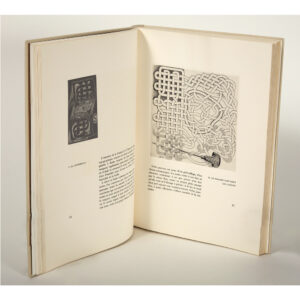Flocon, Albert
Albert Flocon (1909-1994) was a Franco-German engraver and art teacher, renowned for his innovations in curvilinear perspective. He left his mark on the world of engraving with his works combining art and science, and trained many artists at the École des Beaux-Arts in Paris. Today, Flocon is recognized as a master of twentieth-century etching.
Read more
Here is the only result
Albert Flocon biography
Albert Flocon (1909-1994) was a Franco-German painter, engraver and art teacher, best known for his contributions to the art of engraving and his pioneering work in the field of perspective. Born Alfred Otto Wolfgang Schulz in Berlin, he initially trained in advertising before embarking on art studies. After studying at Berlin's Kunstgewerbeschule, he came into contact with the Bauhaus, where he was influenced by its interdisciplinary approach to art and design.
In the 1930s, due to the rise of Nazism in Germany, Flocon left his native country and settled in France, where he adopted the pseudonym Albert Flocon. In Paris, he frequented the artistic circles of Montparnasse and became increasingly interested in engraving, an art in which he quickly excelled.
During the Second World War, Flocon joined the French Resistance, which further anchored him in his French identity. After the war, he devoted himself fully to printmaking, developing a unique style that combines technical rigor with abundant imagination.
Flocon is best known for his explorations of curvilinear perspective, a complex technique that enables three-dimensional spaces to be represented on flat surfaces with mathematical precision. His book "La Perspective curviligne" (1964), written in collaboration with mathematician André Barre, is an essential reference in the field. This theoretical and practical work made Flocon a key figure in the art of engraving, admired for his ability to blend art and science.
In addition to his work as an artist, Albert Flocon was also an influential teacher. He taught engraving at the École des Beaux-Arts in Paris, where he trained numerous artists and contributed to the renaissance of the art in France. His teaching and research have had a lasting impact on several generations of artists.
Flocon's works, which include etchings, drawings and illustrations, are marked by a profound reflection on space and perception. His compositions, often geometric and abstract, explore the limits of visual representation and challenge traditional artistic conventions.
Albert Flocon died in Paris in 1994, leaving behind a rich and complex legacy that continues to influence the world of printmaking and visual art. Today, he is recognized as one of the great printmaking masters of the 20th century, whose work combines artistic exploration with exceptional scientific rigor.

